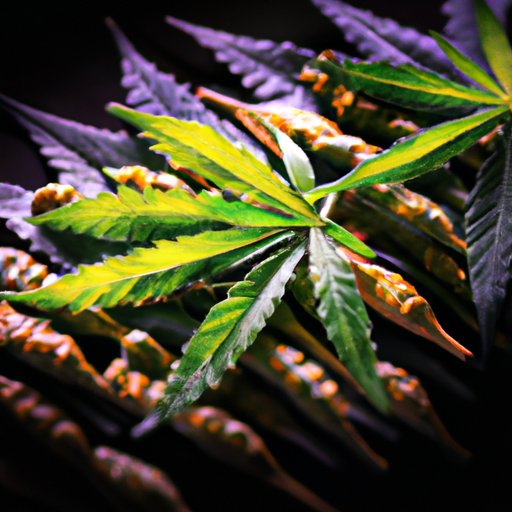
The Effects of CBD on Appetite: What You Need to Know
One of the most common questions surrounding CBD, or cannabidiol, is whether or not it can increase appetite. With more and more people turning to CBD as a natural alternative for managing various health issues, including chronic pain, anxiety, and epilepsy, it’s important to understand the potential side effects of CBD use, including the impact it might have on hunger and cravings. In this article, we’ll explore the science behind CBD and appetite, take a deep dive into the research, and debunk common myths and misconceptions surrounding this topic.

The Science Behind CBD and Hunger: Separating Fact from Fiction
Before delving into the effects of CBD on appetite, it’s important to understand what CBD is and how it works in the body. CBD is a natural compound derived from the cannabis plant, but unlike THC, another well-known cannabis compound, CBD is non-psychoactive. Instead of producing a “high,” CBD interacts with the body’s endocannabinoid system (ECS), a complex network of receptors that helps to regulate various bodily functions, including hunger and metabolism.
Studies have shown that the ECS plays a key role in regulating appetite by communicating with various regions of the brain involved in hunger and satiety. THC, for example, can bind to the ECS receptors in the brain’s hypothalamus, triggering the release of hormones that stimulate hunger. However, research suggests that CBD may have a more complex effect on the ECS, potentially both suppressing and stimulating appetite depending on a variety of factors.
One common misconception about CBD and hunger is that CBD will always cause an increase in appetite, but this is not necessarily the case. In fact, as we’ll explore in more detail in the next section, the effects of CBD on appetite can vary widely depending on a number of factors.
Can CBD Really Give You The Munchies?: A Deep Dive Into The Research
There has been a growing body of research on the effects of CBD on appetite, but the results have been mixed and often conflicting. Some studies suggest that CBD may have a positive impact on appetite, while others have found no significant effect. So what does the research really say?
A 2018 study published in the journal Molecular and Cellular Biochemistry found that CBD increased food intake and weight gain in rats. However, the study also noted that the rats in the CBD group showed significantly lower levels of cytokines, which are proteins associated with inflammation. This suggests that the increased food intake may have been related to the rats’ reduced pain and discomfort, rather than a direct effect of CBD on appetite.
Another study, published in Appetite in 2020, found that CBD had no significant impact on appetite or food intake in healthy adults. The study examined the effects of different doses of CBD (5 mg, 10 mg, and 20 mg) on subjective appetite levels and food intake in a group of 25 participants. While the study did find some minor changes in appetite ratings, there was no significant increase in food intake for any of the CBD doses tested.
A 2016 study published in the Journal of Psychopharmacology, however, found that CBD could stimulate appetite in both normal-weight and overweight individuals. The study involved 14 healthy volunteers, half of whom had a normal body mass index (BMI) while the other half were overweight. The participants were given either a placebo or CBD in different doses (1 mg, 2 mg, or 3 mg), and then offered a buffet meal. The researchers found that those who received CBD consumed significantly more calories than those who received the placebo.
While these studies offer some insight into the effects of CBD on appetite, it’s important to note that they all have their limitations. Most of the studies have been conducted on animals or small groups of human participants, making it difficult to generalize the findings to the wider population. Additionally, many of the studies have used high doses of CBD, which may not reflect the typical doses used by most people who use CBD for managing health conditions.
Exploring the Connection Between CBD and Appetite: What You Need to Know
So, if the research is mixed and often conflicting, what does that mean for people who use CBD and are concerned about its effect on appetite? The truth is that there is no one-size-fits-all answer to whether or not CBD can cause an increase in hunger or cravings. The effects can vary widely depending on individual factors such as dosage, consumption method, and even genetics.
Generally speaking, CBD is thought to have a more appetite-suppressing effect at lower doses, and a more appetite-stimulating effect at higher doses. However, this can also depend on the specific reason for using CBD. For example, someone who is using CBD to manage chronic pain may find that it increases appetite due to a reduction in pain levels, whereas someone using CBD to manage anxiety may find that it reduces appetite due to a reduction in anxiety symptoms.
It’s also worth noting that the way CBD is consumed can have an effect on its impact on hunger and cravings. For example, CBD edibles may have a longer-lasting effect than other consumption methods like vaping or sublingual administration, which can cause a more immediate effect that may wear off more quickly.
If you’re concerned about the impact of CBD on your appetite, there are a few things you can do to manage any potential changes. First, start with a low dose of CBD and gradually increase it as needed. This can help to minimize any unwanted side effects, including changes in hunger. Additionally, be mindful of the foods you’re eating and try to make healthy choices whenever possible, regardless of whether or not you’re using CBD. Staying active and getting plenty of sleep can also help to keep cravings in check.
CBD and Hunger: Debunking Common Myths and Misconceptions
As with many health topics, there are a number of common myths and misconceptions surrounding the effects of CBD on hunger and appetite. One of the most persistent myths is that CBD will always cause an increase in appetite or cravings. While this may be true for some people, it’s not the case across the board.
Another myth is that CBD can cause uncontrollable hunger or binge eating, similar to the “munchies” experienced after using THC. This is unlikely to be the case, as CBD interacts with the ECS in a different way than THC, and is generally thought to have a more subtle impact on appetite and hunger.
It’s also worth addressing the concern that using CBD for appetite management could lead to overeating or weight gain. While there is some evidence to suggest that CBD could stimulate appetite, studies have also shown that it can help to regulate metabolism and reduce inflammation, which could have a positive long-term effect on overall health.

The Truth About CBD and Increased Appetite: An Analysis of the Studies
So, what can we take away from the research on CBD and appetite? While the results have been mixed, it seems that CBD may have the potential to both increase and decrease appetite, depending on a variety of individual factors. While some people may find that CBD increases their hunger or cravings, others may experience no significant changes or even a decrease in appetite.
It’s also important to note that there are a number of potential health benefits associated with CBD use, including pain relief, improved sleep, and reduced anxiety and depression. While managing appetite changes can be a consideration for some people using CBD, it’s important to approach the use of CBD with a balanced and informed perspective, taking into account the full range of potential benefits and risks.
Conclusion
The effects of CBD on appetite can be complex and varied, depending on a range of factors including dosage, consumption method, and individual differences. While some studies have suggested that CBD can increase appetite, others have found no significant effect or even a decrease in hunger. As with any supplement or medication, it’s important to approach the use of CBD with a balanced and informed perspective, taking into account potential risks and benefits. By starting with a low dose, being mindful of food choices, and staying in tune with your body’s unique response to CBD, you can manage any potential changes in appetite and reap the full range of benefits associated with CBD use.
